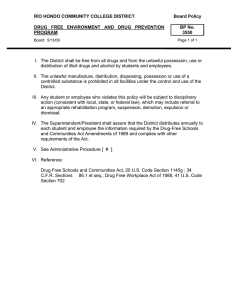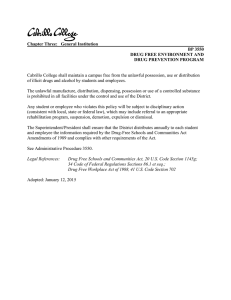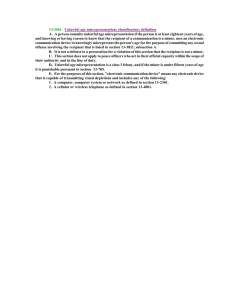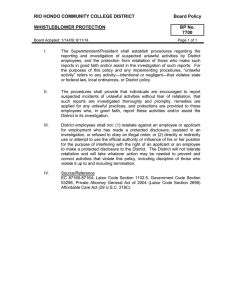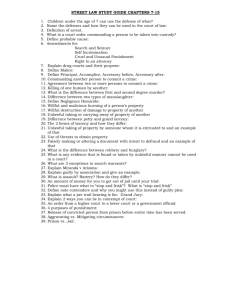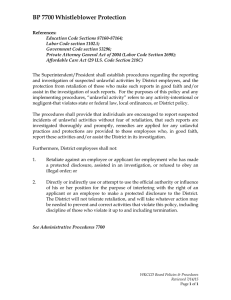Allegan State Game Area
advertisement
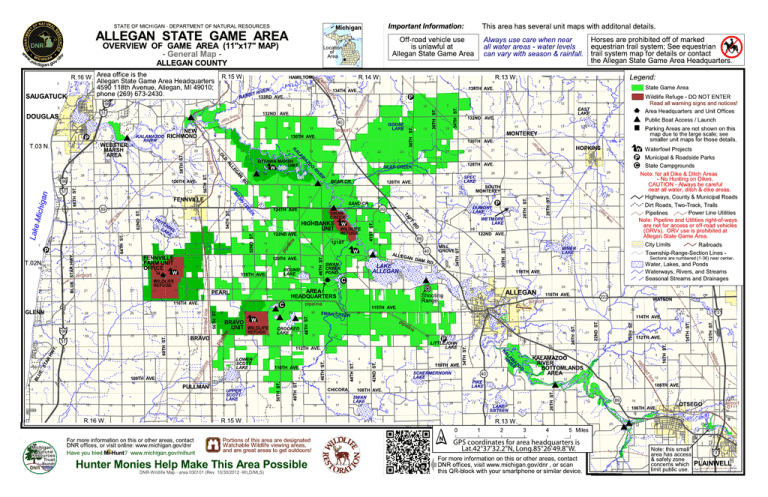
GPS coordinates for area headquarters is Lat.42°37'32.2"N, Long.85°26'49.8"W. MICHIGAN DEPARTMENT OF NATURAL RESOURCES (DNR) - www.michigan.gov/dnr STATE OF MICHIGAN – DEPARTMENT OF NATURAL RESOURCES – www.michigan.gov ALLEGAN STATE GAME AREA BACKGROUND AND SPECIAL USE INFORMATION Have you Tried Mi-Hunt? www.michigan.gov/mihunt If you have questions or comments about this area or its management, please contact DNR Wildlife staff at Allegan State Game Area Headquarters at 4590 118th Avenue, Allegan, MI 49010, phone (269) 673-2430. More detailed maps and additional information are available from the area headquarters, unit offices, or on the internet at the Michigan Department of Natural Resources website at “ http://www.michigan.gov/dnr“. In 1964, the Michigan Department of Natural Resources created the Allegan State Game Area by combining the Allegan State Forest, the Swan Creek Wildlife Experiment Station, and the Fennville State Game Area. The 50,000-plus acre unit provides a wide variety of recreation for everyone with an outdoor interest - for hunting and fishing, a hike, a relaxing picnic, a quick visit or a longer stay. The Game Area is located in the oak and pine dominated sandy lakeplain ecosystem of west-central Allegan County between Allegan and Fennville, about 10 miles east of Lake Michigan. Highway M-89 crosses the area from east to west, and the Kalamazoo River flows northwesterly through the area to Lake Michigan. The Allegan State Game Area may be reached from I-196 via the Glenn, Fennville, and Holland exits, and from US-131 via the Hopkins, Allegan, and Otsego exits. Every season offers a wealth of recreational opportunities: year-round hunting, camping, hiking, and swimming during the warm months; and dog sledding, cross-country skiing, and snowmobiling in the winter. Fishing opportunities are available during all seasons. There are many opportunities for outdoor experiences in small or larger groups. If you desire an outdoor stay, two rustic campgrounds are provided with picnic tables, vault toilets, and drinking water. During spring and summer, camping is limited to designated campsites in campgrounds. The south loop of Pine Point Campground has four sites set aside for use by scout, church, and school groups. Campgrounds are administered by the Allegan County Parks Department, at phone (269) 686-9088 or on the internet at www.AlleganCounty.org/Parks . Day visitors can take advantage of the area trail system, varying from short hikes to all-day events. Hiking trails extend four miles along both sides of Swan Creek, and three more miles cross-country connect Ely Lake and Pine Point campgrounds. The Northwest Trail extends the trail system an additional five miles. These marked trails may be used in all seasons, but they are especially beautiful in the spring when the flowering dogwood is in blossom, and in early autumn after frost. Other recreational activities abound. Swimming is available in Swan Creek Pond and Ely Lake. Canoeing on the Kalamazoo River from the Allegan (Calkins) Dam to New Richmond or Saugatuck is a rewarding experience. A snowmobile route crosses the Game Area. A cross-country ski trail is available. The area even offers inviting scenery from the car window during relaxing fall-color tours in the countryside. All off road vehicles (ORVs) are unlawful and not allowed at Allegan SGA. The Game Area offers a wide variety of fish and game to the sportsman. Waterfowl hunters have an opportunity to hunt geese at the Fennville Farm Unit, three miles south of Fennville. Waterfowl hunting is also available in the Bravo Unit, the Highbanks Unit, the Ottawa and Koopman Marshes, along the Kalamazoo River, and along Swan and Bear creeks. The small game season offers pheasant, rabbit, and woodcock hunting at the Farm Unit and ruffed grouse, squirrel, and woodcock hunting on the remainder of the Game Area. Deer may be taken during the southern Michigan firearm, muzzleloading, and archery seasons. Raccoons are abundant throughout the lowland forest. The Department of Natural Resources reintroduced wild turkeys into the state in 1954 on the Allegan State Game Area. In November of 1965, after establishment of a stable flock, the first modern day Michigan season for wild turkeys was held. Hunting for turkeys now takes place each year. Game fishing offers other outdoor fun. Trout may be caught in Swan, Sand, Bear, and Silver creeks. Pike and panfish are caught in Swan Creek Pond. Panfish are taken in Little Tom Lake, and panfish and bass are available in Ely Lake. Salmon and steelhead are caught in the Kalamazoo River and Swan, Bear, and Sand creeks during their annual spawning runs. Wild blueberries, strawberries, blackberries, and mushrooms occur throughout the Game Area in season. Always use care when sampling nature’s produce; please inspect, clearly identify and understand anything you sample. Camera and binocular “hunters” are invited and encouraged to use the Game Area. Bird watchers enjoy the spring and fall migrations of waterfowl, warblers, and many other birds. Some fortunate ones may glimpse the courtship antics of wild turkeys and ruffed grouse. Thousands of Canada geese and mallards and an occasional bald eagle may be seen from October through March on the Farm Unit and in the Swan Creek Marsh west of the Kalamazoo River along M-89. Cameras are welcome, but all visitors must respect the Wildlife Refuge borders and limits – remember it’s unlawful to enter. (Rev. 10/30/2012 –WLD/MLS) ------------------------------------------------------------------------------------------------------- Equal Rights for Natural Resources Users The Michigan Department of Natural Resources (MDNR) provides equal opportunities for employment and access to Michigan’s natural resources. Both State and Federal laws prohibit discrimination on the basis of race, color, national origin, religion, disability, age, sex, height, weight or marital status under the Civil Rights Acts of 1964 as amended (MI PA 453 and MI PA 220, Title V of the Rehabilitation Act of 1973 as amended, and the Americans with Disabilities Act). If you believe that you have been discriminated against in any program, activity, or facility, or if you desire additional information, please write the Human Resources, Michigan Department of Natural Resources, P.O. Box 30028, Lansing, MI 48909-7528, or the Michigan Department of Civil Rights, Cadillac Place, 3054 West Grand Blvd, Suite 3-600, Detroit, MI 48202, or the Division of Federal Assistance, U.S. Fish and Wildlife Service, 4401 North Fairfax Drive, Mail Stop MBSP-4020, , Arlington, VA 22203. For information or assistance on this publication, or for information about other State land areas, contact the Michigan Department of Natural Resources, Wildlife Division, P.O. Box 30444, Lansing, MI 48909-7944, -or- through the internet at “ http://www.michigan.gov/dnr “. TTY / TTD (teletype): 711 (Michigan Relay Center). This publication is available in alternative formats upon request. R EMI NDERS O F ST ATE L AN D RU LES FO R ST ATE WILDLIFE / G AM E ARE AS Revised 2016 Feb. 02 for rules appropriate for State wildlife and game areas, or State Lands other than State Parks & Recreation Areas, from Regulations of Lands Administered by the Michigan DNR. Authority conferred to DNR by 1994 Public Act 451 (Sec. 504), Michigan Compiled Laws (MCL) 324.504. Contact DNR Offices if questions: phone 517-284-6000, or 517-284-9453 for the DNR Wildlife Division. DNR Report-All-Poaching hotline is 800-292-7800. NOTE: It is your responsibility to be informed of all current rules and regulations. This document is a guide and not to be used as complete legal notice or collection of all rules, regulations and laws. Complete listings of official legal regulations and language are available on the DNR website at www.michigan.gov/dnrlaws. Contact the DNR with any questions and to verify regulations. For larger print and links scan the QR-block at far right with a smart phone/device. Multi-page version has more details; plain text version imports to Braille /ADA. RULES below are grouped by similar subject and simplified from exact legal wordings; access all rules, regulations, and laws at www.michigan.gov/dnrlaws. It is unlawful to do the following activities on State lands owned or controlled and posted by DNR, etc.; penalties can vary & can be severe: Posted, Signs and Designated Areas: “Posted” or "properly signed on the ground" means signs posted by DNR, providing reasonable notice of location, boundary, trail, route, area, rule or warning, particular use or activity. “Signs” include signs, markers, notices, posters or other formats of information for the public. "Designated" means listed in official documents, and then signed or posted designating the use. “Permit” or "proper written permission" means DNR-issued written permit or permission for a specific activity. Persons exempt from rules are DNR employees doing work. • Unlawful to enter, use, or occupy State lands for any purpose, when the area is posted against entry “Do NOT Enter”, against use or occupancy, etc. Obey all posted signs or notices. • Unlawful to move, remove, destroy, or deface signs of DNR or other State agencies. • Unlawful to post any signs, handbills, paint or otherwise mark any State resources, like trees, rocks, features, lands, waters, structures, property, etc. This is vandalism and destruction of property. • Unlawful to store or leave any items for more than 24 hours, on any State land - except lawful blinds/stands (see Hunting rules) and lawfully used camp sites (see Camping rules). Rules for Fire, Trash, Alcohol, and Glass: Unlawful to use or ignite fireworks. Unlawful to set fire to contents of trash container or place, bury, or burn trash of any kind. Unlawful to start or build a fire of any kind, except in stove or grill provided by DNR. Unlawful to litter or leave trash in areas; use provided trash containers or take your trash with you. Unlawful to dispose of animal carcass or other remains on State land. Unlawful to dispose of trash (or garbage, refuse, rubbish, etc.) which is not from State land use, into containers provided on State lands. Could include pet/dog feces (see LUOD, Chapt2, Sec.2.108). • Unlawful to possess alcoholic beverages, except if posted as allowed; “Alcoholic beverage” means any substance containing one-half percent or more of alcohol by volume. Exceptions are over-the-counter and prescription medications. • Unlawful to possess glass or any type of glass container, either whole or partially glass, within any areas posted for recreational use for beach, bathing, swimming, wading, or posted “no glass”. • • • • • • Do Not Interrupt Public Land Use -or- Unfairly Use Public Resources: Access, Parking, and Motor Vehicle Related: “Motorized vehicle” means any device which can transport person(s) or property using an energy source (fuel, gasoline) other than wind or muscle-power; a bicycle is muscle-powered. "Off-Road Vehicle (ORV)" means a recreational motor-vehicle capable of cross-country use without a road or trail, over natural terrain (land, snow, ice, marsh, swampland, water, etc.), which includes: typical “all-terrain vehicle” (ATV); motor-bike, motor-cycle; any number of wheels or tracked; multi-drive wheels; amphibious or air-cushion vehicle; or any other motor vehicle transport - but excluding: law enforcement, emergency, fire or military vehicles; registered snowmobile or aircraft; farming, construction or logging vehicles when used in those named functions. “Personal Assistive Mobility Device” (PAMD) means a wheelchair or any device designed solely for personal movement of a person with a mobility impairment, and considered an extension of that person which they can use anywhere foot travel is allowed - and not considered a vehicle. • Unlawful to obstruct or hinder public access to any road, trail, parking, path or open State lands. • Unlawful to park any type of vehicle in areas posted as “no parking”, or “no vehicles”; • Unlawful to park any vehicle outside of designated areas. • A “Michigan Recreation Passport” may be required to access or park in some areas. • Unlawful to park any vehicle in a designated campsite, or otherwise unlawfully occupy a campsite. • Unlawful to park any wheeled motorized vehicle more than 50 feet from the traveled portion of a road, forest road, trail open to wheeled vehicles, or parking lot. • A properly-registered vehicle can be on a forest road which is not posted “no entry” or closed. "Forest road" means a hard-surfaced, gravel or dirt road, or other route capable of travel by a conventional 2-wheel drive 4-wheeled vehicle designated for regular roads, interstate, state, or county highways; “Trail” means a 1-track way for a vehicle less than 50 inches wide. • Unlawful to operate any vehicle including a snowmobile and a bicycle, on anything except a designated “open to the public” road, trail, parking lot, lands, etc., or in an area posted by DNR as open to such vehicle use. Do NOT bypass closed gates with vehicle. • Unlawful to use, operate, or possess a vehicle on a designated State pathway; “pathway” or path means a narrow recreational trail for people and motor vehicle use prohibited • ORV or ATV users should read the many detailed and specific ORV rules (MCL324.81133). • Unlawful to store or leave any property (ORV trailer, etc.) for more than 24 hours, on any State land - except lawful blinds/stands (see Hunting rules) and lawful camp sites (see Camping rules). • Unlawful to disturb a forest road with any device disturbing surface deeper than 2 inches. • Unlawful to hold an event without appropriate DNR permit(s). "Event" means a single, structured, organized, consolidated, scheduled meeting or occurrence, on State land, which may have a fee/ donation required for participation or attending and/or involves more than 20 persons. Examples: races, contests, tournaments, rides, GPS events, scavenger hunts, etc. Note: this Boating Related: excludes licensed and/or DNR offered managed or special hunts, and lawful group/ party hunts. “PAS” means Public Access Sites and Harbors. “Vessel” or “water craft” means every type of device • Unlawful to be excessively loud, like using a loudspeaker, sound-amplifying equipment, or any (craft, ship, boat, raft, canoe, etc.) used for transportation on water. device (motor, radio, TV, generator, etc.); for all noisy devices, quiet hours are 10pm-8am. • Unlawful to enter, use, or occupy any areas between 11pm–4am daily - where specifically posted as closed during those hours. Reaching some PAS requires a recreation passport to enter, park. Exceptions: lawful hunting and trapping, and DNR approved game-calling devices when hunting. • Unlawful to engage in disorderly conduct or disruptive behavior, violent, abusive, loud, • Unlawful to enter certain specifically named State areas, PAS, harbors, dams, etc. which are posted closed or no entry (even walk-in), no entry with vehicles, or only enter with a recreation passport. boisterous, vulgar, lewd, bullying, or otherwise unlawful and illegal personal-behavior in public. • Unlawful to use State land or resources for any commercial operation, without an appropriate • Unlawful to block access to boat launch/ ramp, PAS, except while launching or retrieving a vessel. DNR permit; "Commercial operation" is any activity involving, directly or indirectly, an attempt-to- • Unlawful to operate motor above idle speed, at DNR launch/ ramp, unless propeller disengaged. offer or an exchange like buying and selling or barter of anything of value, goods or services, etc. • Unlawful to moor or raft off a State dock or PAS, without having paid appropriate dock fees. • Unlawful to beg, peddle, or solicit business of any kind. Unlawful to distribute or post any handbills or • Unlawful to swim, wade, or bathe, where such activities are specifically posted as prohibited. advertising materials, signs, vandalize, paint or otherwise mark any State land or resources. • Unlawful to camp (on the ground) in PAS, except in designated campsites; see Camping rules. • Unlawful to place, construct or occupy any structure, fence or barrier, or modify or enclose State • Camping related rules DO apply to vessels when anchored, tied, or moored in State waters or lands or resources, unlawful trespass, etc. – exception is lawful blinds/stands (see Hunting rules). waters immediately offshore of State lands, within 10 pm to 8 am or when persons sleeping. • Unlawful to destroy, damage, or remove any State resources like animals, trees, shrubs, • Beware of water ditches and ditch/dike areas which may have unexpected deep water and which wildflowers, grasses, other vegetation, etc. - except in DNR approved plots. Exceptions: lawful poses a drowning risk. Beware of thin ice areas. personal take of mushrooms, berries, edible fruits or nuts for personal use (to 25 lbs.) allowed by • Unlawful to store or leave any property (items like trailers, boats, fish shanty, trailer, supplies or DNR or with DNR permit. All animal take or harvest is DNR licensed. containers, etc.) for more than 24 hours – except lawful blinds/stands (see Hunting rules), lawfully • Unlawful to remove more than 25 pounds total weight per individual per year (and must be for an used camp sites (see Camping rules), or lawfully set ice shacks. individual personal or non-commercial hobby), of any rock, mineral specimen (exclusive of rules • See additional special rules for unique boating-related situations (unattended vessels, etc.). for gold bearing material), sand or topsoil, invertebrate fossil, or other resources from State land. Camping Related: "Camp" means: set-up/ place and occupy a tent, tent-type camper, travel Hunting Related: “Public Hunting” means public use for hunting with all appropriate required or house trailer; sleeping in any type of vehicle or water vessels moored off State land, or sleeping in licenses, in correct season, safety conditions, etc. There are many detailed specific rules for hunting. any other manner. “Dispersed camping” is special by-permit camping away from a designated • “Safety Zone” are all areas within 150 yards (450 feet) from any structure which could be camp site, with special rules (not all listed here). “Quiet hours” are between 10 pm to 8 am. occupied by a person, wherein there is no discharge of a firearm, and has no hunting - except • Unlawful to camp outside of designated campground areas or sites on any type of State land. under specific special permissions or special conditions (indoor range), etc. • Unlawful to camp inappropriately or in prohibited areas (like in veg. buffers on natural rivers, etc.). • Note: You may retrieve legal game from Safety Zones. • Unlawful to camp in a designated parking area, except those posted to allow camping. • Unlawful to store or leave any property (items) for more than 24 hours, on any State land - except • Unlawful to camp in State wildlife and game areas, between May 15 to Sept. 10, except in lawful ground blinds and tree stands meeting DNR requirements (labelled with owner’s name, no specific designated and signed camping sites noted as approved for use between those dates. screw-in steps, etc.), and lawfully occupied designated camp sites (see Camping rules). In designated campsites, follow DNR directions and requirements, rules for fires, etc., and: • Unlawful to occupy designated camping sites, or use a site for extra parking space, if not permittee Target Shooting: Target shoot in appropriate areas. State shooting ranges have specific rules. • Unlawful to target shoot at anything except paper, cardboard, clay, or one created for target shooting. • Unlawful to register a campsite by a person under 18 years of age; must be an adult, one per camp. • Unlawful to have all persons in one site location or in camp at one time, under 18 years of age. • Unlawful to target shoot at an explosive or incendiary object, or fireworks. Use all weapons safely! • Unlawful to have more than 1 enclosed self-contained camping unit on a single camp site. Rules for Dogs, Pets, Horses and Riding Animals, etc.: Obey all signs for pets. • Unlawful to camp on a site with more than 6 persons (except maybe a “family”; see detailed rules). • Unlawful to leave a campsite unoccupied for more than 24-hours after establishing camp; • Identified service animals (leader dogs for blind, etc.) are not “pets” but legal accommodations. A site is occupied if 1 member of those camping at site is in site during nighttime of 10pm-8am. • There are special use areas and rules for hunting with dogs, dog training, or dog field trial areas. • Unlawful to possess a dog or other pet animal, except if they are under your immediate control on a • Unlawful to use a camp site as a permanent or semi-permanent residence. Unlawful to camp more than 15 consecutive nights in a year in any camp site. leash of 6 feet or less, in a DNR designated recreational day-use areas. A new camp means the new location is more than 1 mile from the previous site. • Unlawful to ride or lead a horse, saddled or pack animal, other riding animal, or any animal-driven vehicle on any State land, except on: roads open to motor vehicles; on DNR designated • Unlawful to store or leave any property (items, trailer, etc.) for more than 24 hours, on any State land – except lawful blinds/stands (see Hunting rules) and lawfully used camp sites. (Doc.Rev. horse/animal trails or bridle paths; in designated campgrounds for animal use; and/or on any State 2016-03-09 forest land not posted closed to such use or such entry. See other equestrian rules for details. DNR Non-Discrimination Statement - read it online or in DNR publications -WLD/MS&JSM dsfafddf
